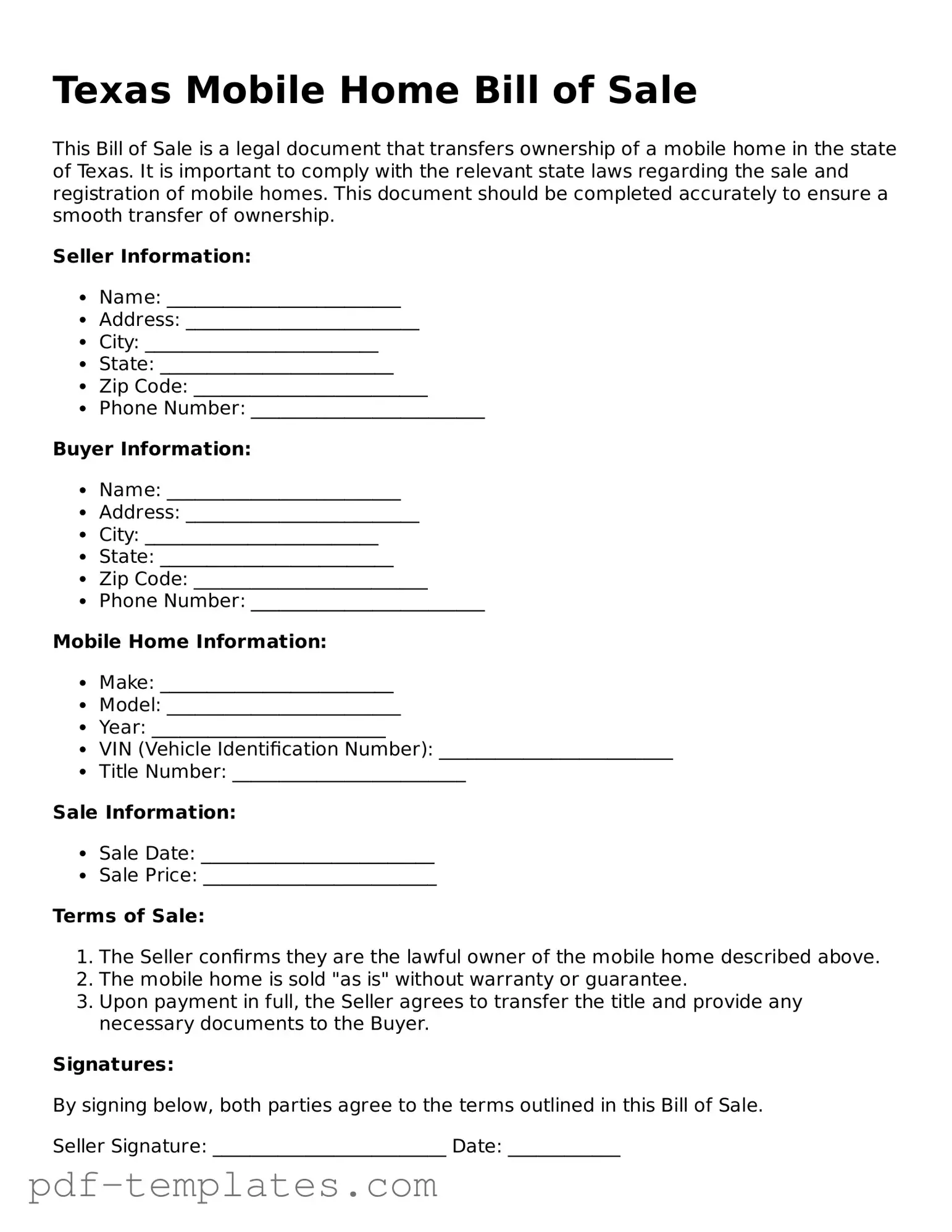The Texas Mobile Home Bill of Sale form bears similarities to the traditional Vehicle Bill of Sale. Both documents serve as proof of transfer of ownership from one party to another. They typically include essential information such as the names and addresses of the buyer and seller, a description of the item being sold, and the sale price. Just as a Vehicle Bill of Sale helps to document the sale of a car or motorcycle, the Mobile Home Bill of Sale formalizes the transfer of ownership for a mobile home, ensuring that both parties have a record of the transaction.
Another document that shares characteristics with the Mobile Home Bill of Sale is the Boat Bill of Sale. Like mobile homes, boats are significant assets that require proper documentation during a sale. The Boat Bill of Sale outlines the details of the transaction, including the identification of the boat, the sale price, and the signatures of both the buyer and seller. Both forms aim to protect the interests of both parties and provide a clear record of ownership transfer, which is crucial for registration and insurance purposes.
The Real Estate Purchase Agreement is also comparable to the Mobile Home Bill of Sale. While the former typically deals with immovable property, both documents establish the terms of a sale. They detail the parties involved, the property description, and the agreed-upon price. In both cases, these agreements serve to protect the rights of the buyer and seller, ensuring that the transaction is legally binding and that ownership is clearly defined.
Similarly, the Personal Property Bill of Sale is akin to the Mobile Home Bill of Sale. This document is used for various types of personal property transactions, ranging from furniture to electronics. Like the Mobile Home Bill of Sale, it includes the details of the item being sold, the identities of the buyer and seller, and the sale price. Both documents fulfill the same purpose of providing a record of ownership transfer and can be used in legal contexts to resolve disputes.
The Lease Agreement for a mobile home lot can also be seen as related to the Mobile Home Bill of Sale. While one document pertains to the sale of the mobile home itself, the other governs the rental of the space where the mobile home is located. Both agreements outline important terms and conditions, including the parties involved, payment details, and responsibilities. They ensure that both the owner of the mobile home and the lot owner have a clear understanding of their rights and obligations.
When navigating the complexities of employment documentation, it is vital to understand forms such as the USCIS I-9, which plays an essential role in verifying an employee's identity and work eligibility in the United States. For those needing assistance with the I-9 process, resources like documentonline.org/blank-uscis-i-9/ can provide the necessary guidance to ensure compliance and clarity.
Another document with similarities is the Manufactured Home Affidavit of Affixation. This form is used when a manufactured home is permanently attached to land, converting it from personal property to real property. While the Mobile Home Bill of Sale documents the sale, the Affidavit of Affixation formalizes the change in the home’s status. Both documents are crucial in the context of ownership and can affect property taxes, insurance, and financing options.
Lastly, the Warranty Deed can be compared to the Mobile Home Bill of Sale in the context of property transactions. A Warranty Deed serves as a legal document that guarantees the seller has the right to sell the property and that the title is clear of any encumbrances. While the Mobile Home Bill of Sale focuses on the transfer of ownership for a mobile home, both documents share the goal of providing assurance to the buyer regarding the legitimacy of the sale and the condition of the property being transferred.
